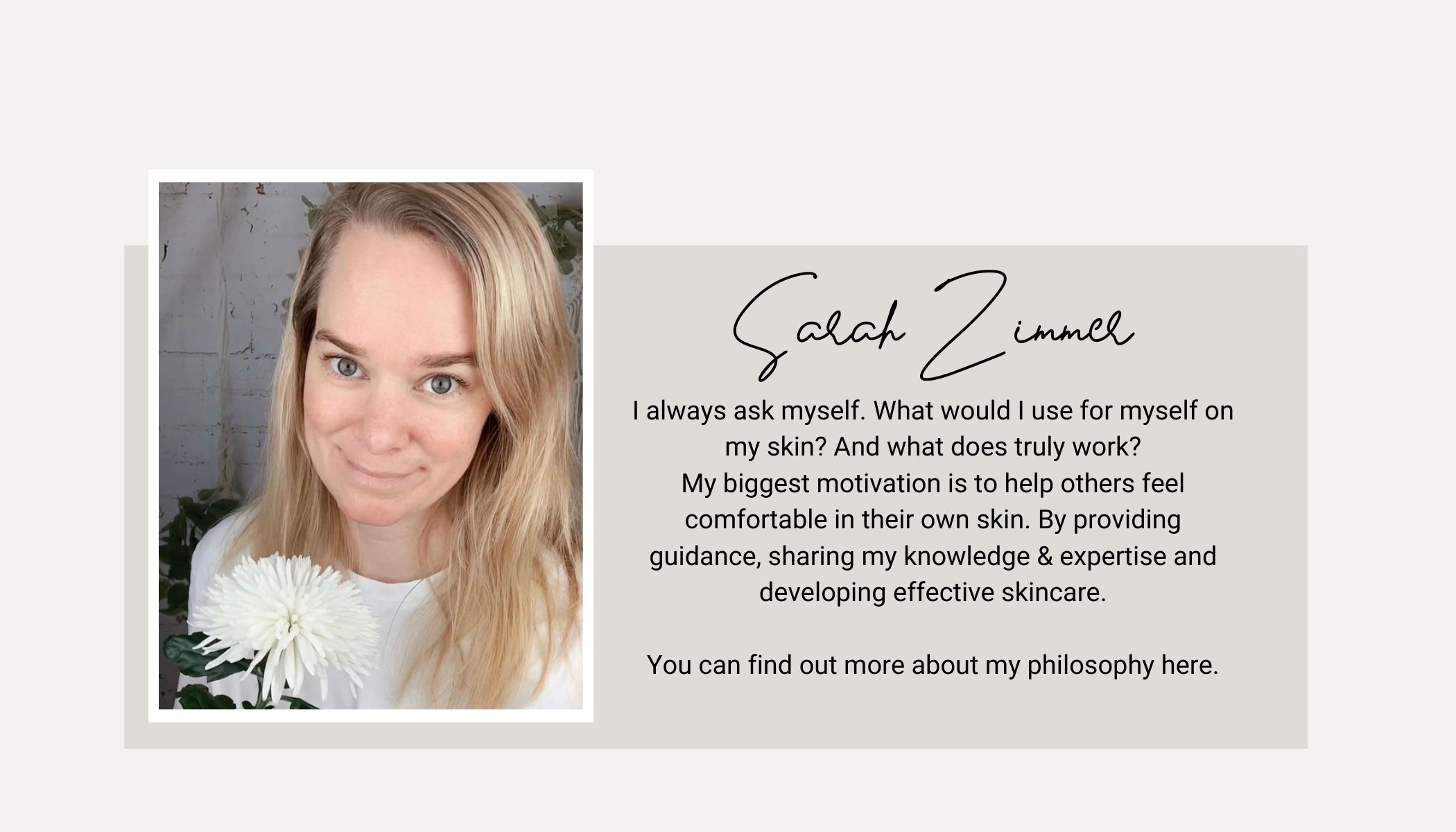Braucht deine Haut wirklich Kollagen?

Welche Rolle spielt Kollagen in deiner Hautpflege-Routine?
Wir alle möchten länger jung aussehen und am liebsten die Zeit zurückdrehen. Wenn wir alte Bilder von uns anschauen und ein glattes, straffes Gesicht sehen. Viele suchen nach der Zauberformel, die diese jugendliche Haut länger bewahrt. Und wenn du bei Google, Bing oder anderen Suchmaschinen nach Anti-Aging-Hautpflegeprodukten suchst, wirst du unweigerlich auf das Schlagwort: Kollagen stoßen.
Viele Marken behaupten, dass Kollagen die Antwort auf feine Linien, Falten und schlaue Haut ist. Marketingaussagen wie „dein Kollagen auffüllen“ oder „die Kollagenproduktion anregen für eine straffere Haut“. Doch oft ohne fundierte wissenschaftliche Belege oder in vitro Studien. Werfen wir einen genaueren Blick auf Kollagen und was es wirklich leisten kann.
Kollagen: Wo findest du es in deinem Körper?
Kollagen ist das Hauptstrukturprotein des extrazellulären Raums in verschiedenen Bindegeweben, einschließlich der Dermis, der mittleren Hautschicht unterhalb der Epidermis. Das Bindegewebe der Dermis sorgt für Festigkeit und Elastizität der Haut durch eine extrazelluläre Matrix aus Kollagen- und Elastinfasern.
Kollagen ist das am häufigsten vorkommende Protein im menschlichen Körper und macht 25% bis 35% des gesamten Körperproteins aus. Bis heute wurden 29 verschiedene Kollagentypen beschrieben, wobei jedoch mehr als 90% des Kollagens im Körper aus den Typen I bis V bestehen, wobei Typ I am häufigsten vorkommt. Hier siehst du, wo Kollagentypen I bis V zu finden sind.
- Kollagen Typ I: Haut, Sehnen, Blutgefäße, Bänder, Organe, Knochen
- Kollagen Typ II: Knorpel
- Kollagen Typ III: Netzfasern
- Kollagen Typ IV: bildet die Grundlage der Zellmembran
- Kollagen Typ V: kommt in Geweben vor, die Typ I enthalten
Warum ist Typ I das häufigste Kollagen? Weil es in der gesamten Haut vorkommt, die unser größtes Organ ist. Kollagen sorgt für die Schönheitseigenschaften, die wir alle anstreben: Festigkeit und Elastizität.
Kollagen: Das langsame Wunder
Doch mit 30 beginnen viele unserer Prozesse im Körper langsamer zu werden. Das bedeutet, dass Kollagen in unserer Haut schneller abgebaut wird, als es nachgebildet wird. Und als Ergebnis wird unsere Haut zunehmend dünner, verliert an Elastizität, Stärke, was zu schlaffer Haut und Faltenbildung führt. Alle drei Hautschichten sind von diesem natürlichen Prozess betroffen. In verschiedenen wissenschaftlichen Arbeiten wurde festgestellt, dass die Kollagenproduktion mit jedem Jahr nach der Reife um etwa 1% sinkt, was zu einem Verlust an Festigkeit und Elastizität der Haut führt. (Cosmetic Dermatology)
Kollagen: Ist der Hype um diesen Inhaltsstoff in Hautpflegeprodukten gerechtfertigt?
Soweit unsere Recherchen reichen, haben wir keine wissenschaftlichen Arbeiten gefunden, die belegen, dass der Kollagenabbau durch topische Anwendung von Kollagen gestoppt werden kann. Doch obwohl es keinen wissenschaftlichen Beweis gibt, gibt es viele Produkte, die das Gegenteil behaupten. Trotz der wichtigen Rolle von Kollagen in der Haut, hat die Zugabe von Kollagen in ein topisches Produkt keinen großen Effekt. Der Grund: Die Molekülgröße von Kollagen ist zu groß, um die oberste Hautschicht zu durchdringen. Das bedeutet, es kann nicht in tiefere Hautschichten gelangen, um die Anti-Aging-Vorteile zu liefern, die wir uns alle wünschen. Der Hauptnutzen von Kollagen-Auftragen ist, die Haut zu befeuchten. Es gibt jedoch viele kostengünstigere Inhaltsstoffe, die deine Haut effektiv mit Feuchtigkeit versorgen können.
Was kannst du stattdessen tun, um Kollagen zu schützen und wieder aufzubauen?
Eine gesunde Hautbarriere
Eine gesunde und funktionierende Hautbarriere ist ein wichtiger Schutz gegen Dehydrierung, das Eindringen von Mikroorganismen, Allergenen, Reizstoffen, reaktiven Sauerstoffspezies und Strahlung. Die Hautbarriere kann gezielt angepasst werden, um das Eindringen zu ermöglichen. Aus diesem Grund kann eine tägliche Hautpflege mit den richtigen Inhaltsstoffen die Hautregeneration, Elastizität, Glätte und damit vorübergehend den Hautzustand verbessern. Es ist jedoch notwendig, den Abbau der primären strukturellen Bestandteile der Haut, wie Kollagen und Elastin, zu stoppen, um die Bildung von Falten zu verhindern. Auch wenn die Technologie, diese Verbindungen effektiv in die Haut zu transportieren, noch nicht entwickelt wurde, fördern einige Produkte die natürliche Synthese dieser Substanzen. Eine weitere Möglichkeit, die Faltenbildung zu verhindern, ist die Reduktion von Entzündungen durch topische Antioxidantien, die in Kombination mit Sonnenschutzmitteln und Retinoiden verwendet werden sollten, um ihre schützende Wirkung zu verstärken. Da du jetzt verstehst, dass topische Kollagen-Produkte nicht sehr effektiv bei der Bekämpfung von Alterungsprozessen sind, gibt es dennoch Möglichkeiten, den Abbau von Kollagen zu verlangsamen.
Topische Produkte
Topisches Vitamin C
Studien haben gezeigt, dass Vitamin C in Form von L-Ascorbinsäure mit Konzentrationen zwischen 5% und 15% einen nachgewiesenen Anti-Aging-Effekt auf die Haut hat, indem es die Produktion von Kollagentypen I und III anregt. (Dermatoendocrinol. 2012) Du musst nicht über 15% gehen, da deine Haut mehr als 15% nicht verarbeiten kann. Bitte beachte, dass dies nur für L-Ascorbinsäure gilt und nicht für die verschiedenen Vitamin-C-Derivate, die heute auf dem Markt erhältlich sind. Entdecke unseren Antioxidant Defence Booster, der reich an L-Ascorbinsäure ist und dir täglich einen frischen Vitamin-C-Schub im Badezimmer ermöglicht.
Retinoide
Retinoide haben wissenschaftlich vielfach gezeigt, dass sie die Kollagenproduktion in der Haut steigern, und damit das Erscheinungsbild von feinen Linien und Falten verringern. Sie tun dies, indem sie den natürlichen Erneuerungszyklus der Haut beschleunigen. Wenn dies geschieht, hast du mehr gesunde, voll funktionsfähige Hautzellen: Diese jungen Zellen sind besser in der Lage, Kollagen zu produzieren. Während Retinol stärker wirkt und nach wenigen Anwendungen Ergebnisse liefert, kannst du auch Phyto-Retinol wählen, das die Kollagenproduktion der Haut auf natürlichere und sanftere Weise unterstützt.
Glycolsäure Es wurde gezeigt, dass sie die Kollagenproduktion steigert, wenn sie topisch angewendet wird. Es wird angenommen, dass sie dies tut, indem sie eine heilende Reaktion in der Haut auslöst, die die Kollagenproduktion anregt.
Es gibt auch invasivere Behandlungen wie Laserbehandlungen, chemische Peelings und Co., die am besten mit deinem Dermatologen besprochen werden sollten.








Thank you it was very informative 😁
Hinterlasse einen Kommentar